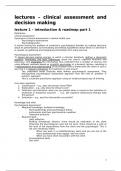Notizen
Lecture Notes - Clinical Assessment and Decision Making
- Kurs
- Hochschule
Here are my lecture notes of all lectures of the course Clinical Assessment and Decision Making (SOW-PSB3DH23E). The notes include the pictures and assignments used in the slides. With these notes, I finished this course with a 9
[ Mehr anzeigen ]



